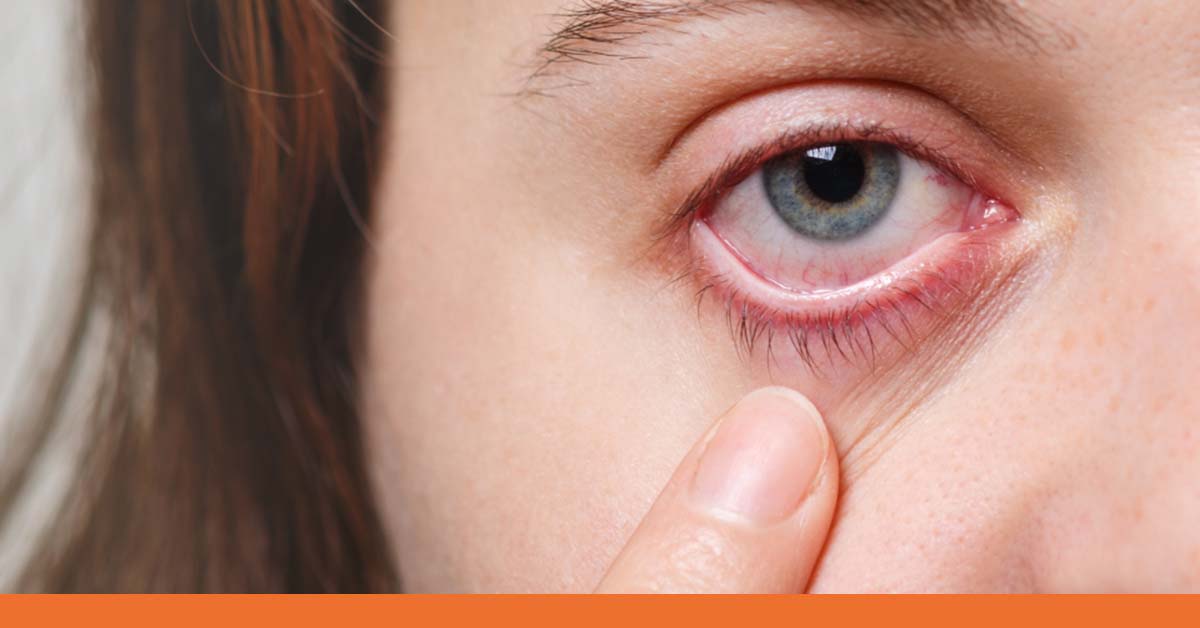
Pink eye, medically known as conjunctivitis, is a common eye condition that many people experience at least once in their lifetime. Understanding its causes and recognizing when to seek treatment from a primary care doctor in Bridgeport, CT, is crucial for effective management and recovery. If you think you’re suffering from pink eye, we’ll delve into its common causes and guide you on when to consult a primary care doctor in Bridgeport, CT.

✔ Viral Conjunctivitis: This is a highly contagious form of pink eye caused by viruses, often accompanied by cold or flu symptoms.
✔ Bacterial Conjunctivitis: Resulting from bacterial infections, this type produces a thick, yellowish discharge and can be treated with antibiotics.
✔ Allergic Conjunctivitis: Triggered by allergens like pollen or pet dander, this form causes itching and redness but isn’t contagious.
✔ Chemical Conjunctivitis: Direct exposure to irritants or chemicals leads to this form, requiring immediate rinsing and medical attention.
✔ When to Seek Primary Care Doctor Bridgeport, CT, for Treatment: If you experience persistent or severe symptoms of pink eye, it’s crucial to consult a primary care doctor in Bridgeport, CT, for accurate diagnosis and treatment.
Conjunctivitis, commonly known as pink eye, is an inflammation of the conjunctiva, the transparent membrane that lines the eyelid and covers the white part of the eyeball. When the small blood vessels in the conjunctiva become inflamed, they’re more visible, giving the eye a pink or reddish appearance. The causes of pink eye are varied, and understanding them can help in seeking timely treatment from a primary care doctor in Bridgeport, CT.
Viral conjunctivitis, often called “pink eye,” is a common eye condition caused by a viral infection. It’s characterized by the inflammation of the conjunctiva, the transparent membrane that lines the eyelid and covers the white part of the eyeball. This inflammation gives the eye its distinctive pink or reddish appearance. Understanding the nuances of viral conjunctivitis is crucial, especially when seeking treatment from a primary care doctor in Bridgeport, CT.
Adenoviruses, a group of viruses responsible for various diseases, including respiratory infections and the common cold, primarily cause viral conjunctivitis. However, other viruses, such as the herpes simplex virus, varicella-zoster virus, and picornavirus, can also lead to this condition. The contagious nature of these viruses means that viral conjunctivitis can spread rapidly, especially in close-knit environments like schools, offices, and homes.
The onset of viral conjunctivitis is usually marked by:
In some cases, individuals might also experience flu-like symptoms such as a runny nose or sore throat. If you notice these symptoms, it’s essential to consult a primary care doctor in Bridgeport, CT, promptly.
Viral conjunctivitis is highly contagious. It can spread through:
Given its contagious nature, practicing good hygiene is crucial to prevent its spread. If you suspect you have viral conjunctivitis, you should see a primary care doctor in Bridgeport, CT, to confirm the diagnosis and get guidance on managing the condition.
While there’s no specific antiviral medication for most cases of viral conjunctivitis, the condition usually resolves within one to two weeks. However, reputable centers like DOCS Urgent Care & Primary Care – Bridgeport can recommend measures to alleviate symptoms and prevent the spread of the infection. Some recommended treatments and precautions include:
In cases where the herpes simplex virus causes conjunctivitis, antiviral medications might be prescribed. Regular follow-ups with a primary care doctor in Bridgeport, CT, are essential to monitor and resolve the condition as expected.
Bacterial conjunctivitis, distinct from its viral counterpart, is an eye infection caused by bacteria. This type of pink eye can be painful and, if left untreated, may lead to serious complications. Recognizing the symptoms and understanding the treatment options is crucial, especially when considering the expertise of a primary care doctor in Bridgeport, CT.
Bacterial conjunctivitis is caused by various bacteria, with the most common culprits being Staphylococcus aureus, Streptococcus pneumoniae, and Haemophilus influenzae. These bacteria can be part of the natural flora of the human body, residing harmlessly on the skin or nose. However, when they come into contact with the eye, they can cause an infection.
The symptoms of bacterial conjunctivitis can be quite pronounced, making it relatively easy to identify. They include:
If you or someone you know exhibits these symptoms, it’s essential to consult a primary care doctor in Bridgeport, CT, for an accurate diagnosis and appropriate treatment.
Bacterial conjunctivitis is contagious and can spread through various means:
Given its contagious nature, taking precautions to prevent its spread is vital. If diagnosed with bacterial conjunctivitis, it’s advisable to follow the guidance of a primary care doctor in Bridgeport, CT, to manage the condition and prevent infecting others.
Unlike viral conjunctivitis, bacterial conjunctivitis can be treated with antibiotics. Trusted centers like DOCS Urgent Care & Primary Care – Bridgeport, will typically prescribe antibiotic eye drops or ointments. Some general guidelines for treatment include:
It’s crucial to note that even if symptoms improve within a few days, the entire course of antibiotics should be completed to ensure the bacteria are entirely eradicated. Regular follow-ups with a primary care doctor in Bridgeport, CT, are essential to ensure the infection is cleared up and address potential complications.
Allergic conjunctivitis is an eye inflammation caused by an allergic reaction to substances like pollen, dust, or animal dander. Unlike bacterial or viral conjunctivitis, this type is not contagious but can be incredibly uncomfortable and disruptive to daily life. Recognizing its triggers, understanding its symptoms, and knowing when to consult a primary care doctor in Bridgeport, CT, can make a significant difference in managing this condition.
Allergic conjunctivitis occurs when the eyes come into contact with allergens, triggering an allergic reaction. The body releases histamines in response to these allergens, leading to the symptoms of allergic conjunctivitis.
Common allergens Include:
For those predisposed to allergies, understanding and avoiding specific triggers can be a crucial step in managing allergic conjunctivitis. If you’re unsure about what might be causing your symptoms, a primary care doctor in Bridgeport, CT, can provide allergy testing to identify specific allergens.
The symptoms of allergic conjunctivitis can be quite distressing, including:
These symptoms can be seasonal, flaring up at particular times of the year, or perennial, occurring year-round. Recognizing these symptoms and their patterns can be instrumental in seeking timely advice and treatment from a primary care doctor in Bridgeport, CT.
The primary goal in treating allergic conjunctivitis is to avoid or limit exposure to the allergens causing the symptoms. However, when exposure is unavoidable, several treatments can help manage the symptoms:
Regular check-ups with a primary care doctor in Bridgeport, CT, are essential to monitor the condition and adjust treatments as necessary.

Chemical conjunctivitis is a type of eye irritation caused by exposure to chemicals or irritants. Unlike bacterial, viral, or allergic conjunctivitis, this form is not due to an infection or allergic reaction but rather a direct chemical insult to the eye. Whether it’s an accidental splash of a cleaning agent or prolonged exposure to environmental pollutants, understanding chemical conjunctivitis and knowing when to seek the expertise of a primary care doctor in Bridgeport, CT, is essential for optimal eye health.
Chemical conjunctivitis arises when harmful chemicals come into contact with the eye’s surface. This can lead to an immediate inflammatory response as the eye tries to combat the irritant.
Recognizing potential hazards in everyday environments and taking preventive measures can significantly reduce the risk of developing chemical conjunctivitis. However, if an exposure occurs, it’s crucial to consult a primary care doctor in Bridgeport, CT, for appropriate care.
The symptoms of chemical conjunctivitis can vary based on the type and concentration of the chemical involved. Common symptoms include:
Immediate burning or stinging sensation
If you or someone you know experiences these symptoms following chemical exposure, it’s imperative to seek medical attention and consult a primary care doctor in Bridgeport, CT.
In the event of chemical exposure to the eyes, immediate action can make a significant difference in the outcome. Here’s what you should do:
The treatment for chemical conjunctivitis primarily focuses on alleviating symptoms and promoting healing. Depending on the severity of the exposure, experienced centers like DOCS Urgent Care & Primary Care – Bridgeport might recommend:
The healing time for chemical conjunctivitis varies based on the severity of the exposure and the type of chemical involved. Generally, mild cases can resolve within 24 to 48 hours with proper care. However, more severe exposures might take a week or longer to heal. Regular follow-ups with a primary care doctor in Bridgeport, CT, can help monitor the healing process.
While over-the-counter eye drops can temporarily relieve symptoms like dryness or irritation, they may not address the underlying cause of chemical conjunctivitis. It’s essential to consult a primary care doctor in Bridgeport, CT, before using any medication to ensure it’s appropriate for the condition. Some over-the-counter drops might also contain preservatives that could further irritate the eyes.
While immediate rinsing with clean water is the primary home remedy, avoiding using substances or homemade solutions on the eyes is crucial without medical advice. Some home remedies might exacerbate the condition or introduce new irritants. Always prioritize professional medical guidance from a primary care doctor in Bridgeport, CT, over unverified home treatments.
It’s advisable to avoid wearing contact lenses until the eyes have fully healed from chemical conjunctivitis. Contacts might trap residues or irritants against the eye, prolonging healing. Once the condition has resolved, thoroughly clean the lenses, or consider using a fresh pair. A primary care doctor in Bridgeport, CT, can guide you on when it’s safe to resume wearing contacts.
Prevention is the best approach to avoid chemical conjunctivitis. Always wear safety goggles when handling chemicals or working in environments with potential irritants. Ensure proper ventilation when using volatile substances and always follow safety guidelines on product labels. Regular eye check-ups with a primary care doctor in Bridgeport, CT, can also provide personalized preventive measures.
Immediate action is crucial if a child gets a chemical substance in their eyes. Start by rinsing the child’s eyes with cool, clean water for at least 15 minutes, ensuring the eyelids are open and the water covers the entire eye surface. Avoid using any other substances or solutions for rinsing. After thorough rinsing, seek emergency medical attention or consult a primary care doctor in Bridgeport, CT, to assess the extent of the exposure and recommend further treatment.
If you or a loved one is experiencing symptoms of conjunctivitis or any other eye-related concerns, DOCS Urgent Care & Primary Care – Bridgeport is here for you. Our dedicated professionals are equipped with the knowledge and tools to provide top-notch care tailored to your needs. Don’t wait; prioritize your eye health, and let us be your trusted partner. Contact us today!


During this surge in COVID-19 cases, our primary focus is meeting the high demand for tests, and we are seeing higher than usual wait times. This means we are unable to answer most phone calls. Please know that our teams are working very hard during this time to care for as many patients as safely as possible. Please click the button below for answers to common questions. We appreciate your understanding.